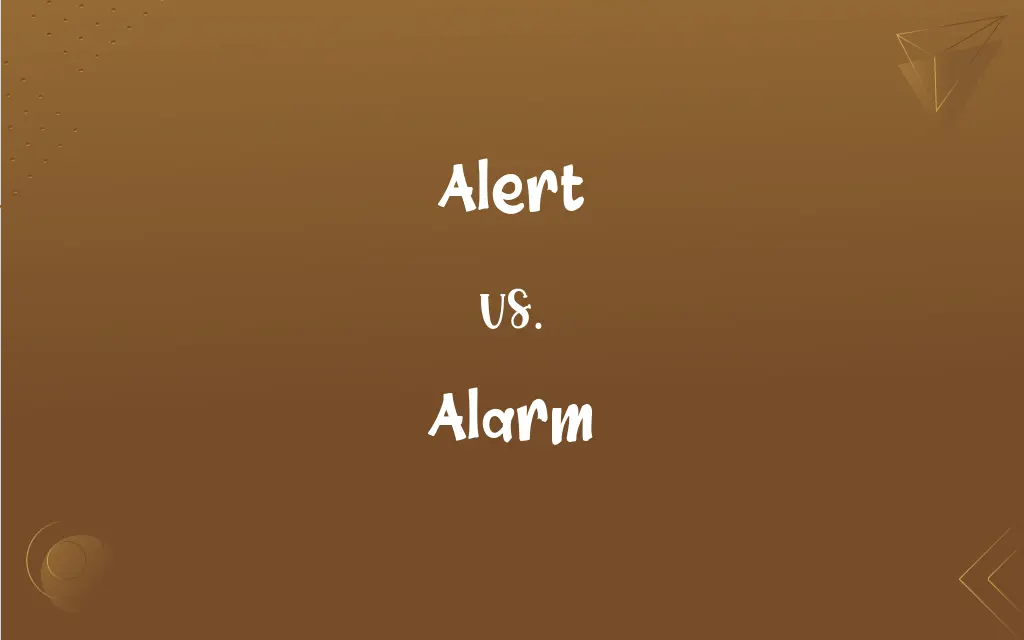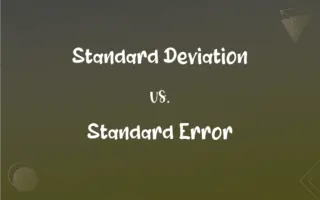Alert vs. Alarm: What's the Difference?
Edited by Janet White || By Harlon Moss || Published on November 14, 2023
An alert is a notification or warning of a potential threat, while an alarm is a sudden, urgent signal indicating immediate danger or emergency.

Key Differences
An alert serves as a notification or heads-up to make someone aware of a situation. It preempts potential problems and often gives recipients time to prepare or adjust. Conversely, an alarm indicates a sense of immediacy and urgency, often signaling that a threat is imminent or currently occurring. It demands immediate attention or action.
When considering technological contexts, an alert might pop up on your computer or smartphone, indicating software updates or new messages. Such notifications are often informational and don’t require immediate action. In contrast, an alarm, like a fire alarm or car alarm, is designed to draw immediate attention and usually signifies a breach or danger.
In human behavior and responsiveness, being "alert" suggests being attentive and vigilant, ready to respond if necessary. It involves an active state of consciousness. An "alarm," however, often evokes feelings of panic or distress, pushing one to take swift action in response to a perceived threat.
From a linguistic standpoint, both "alert" and "alarm" can be used as nouns and verbs. For instance, one can be "on alert" (noun) or "alert someone" (verb). Similarly, one can "sound the alarm" (noun) or "alarm someone" (verb). Yet, their connotations differ; "alert" is more anticipatory, and "alarm" suggests immediacy.
While both alerts and alarms serve to notify or warn, their intensity and purpose can differ. Alerts are often more informational, helping one stay informed or prepared. Alarms are more action-oriented, signaling an immediate need for attention due to danger or emergency.
ADVERTISEMENT
Comparison Chart
Purpose
Notification or warning of potential threat
Signal indicating immediate danger or emergency
Sense of Urgency
Anticipatory
Immediate
Technological Use
Software updates, new messages
Fire alarm, car alarm
Human Responsiveness
Attentive and vigilant
Evokes panic, requires swift action
Linguistic Form
Can be both noun and verb
Can be both noun and verb
ADVERTISEMENT
Alert and Alarm Definitions
Alert
An urgent notice to be on the lookout.
The police issued an alert for a missing person.
Alarm
A warning sound or device to alert of a specific condition or threat.
The car alarm went off when he tried to open the door without a key.
Alert
A notification or warning about something.
The weather app sent an alert about the upcoming storm.
Alarm
A sudden fear or distressing suspense caused by an awareness of danger.
The loud noise caused an alarm among the residents.
Alert
Being quick to perceive and act.
The guard was alert and noticed the discrepancy immediately.
Alarm
An apparatus or device that produces a sound or visual signal when danger is sensed.
The smoke triggered the fire alarm in the building.
Alert
A state of readiness or vigilance.
The military base is on high alert due to the recent threats.
Alarm
A call to arms or a call to take defensive action.
The castle raised the alarm when they saw approaching enemies.
Alert
A message that provides information or advice.
I received a stock market alert about the fluctuating prices.
Alarm
To fill with apprehension, anxiety, or fear.
The news about the hurricane alarmed the coastal residents.
Alert
Vigilantly attentive; watchful
Alert to danger.
An alert bank guard.
Alarm
Sudden fear or concern caused by the realization of danger or an impending setback.
Alarm
A warning of existing or approaching danger
The committee's report issued an alarm about the dangerous condition of the town's buildings.
FAQs
Does an alarm always mean immediate action is needed?
Typically, an alarm indicates a need for swift attention due to perceived danger.
Can "alert" be used as a verb?
Yes, e.g., "She alerted the authorities."
Is an "alarm clock" related to danger?
No, it's named for its function to "alarm" or awaken a person, not indicate danger.
Are alerts always auditory?
No, alerts can be visual, auditory, or even tactile.
Is an alert always a sign of danger?
No, an alert can be informational, like a software update notification.
What's the primary goal of an alert?
To inform or warn, allowing for preparation or adjustment.
Can someone be described as alert?
Yes, it means the person is attentive and vigilant.
Why might someone feel alarmed?
Due to sudden fear, distress, or awareness of imminent danger.
Why are fire alarms loud?
To immediately draw attention and ensure swift evacuation or action.
Can an alert evolve into an alarm?
Yes, if a potential threat intensifies, an alert can escalate to an alarm.
How can one differentiate between a test alarm and a real one?
Often through announcements, the frequency of the sound, or accompanying messages.
Is an "amber alert" related to color?
No, it's a system for publicizing child abductions. "Amber" refers to a named case, not the color.
Can both alerts and alarms be silent?
Yes, they can be silent and signaled through visuals or vibrations, especially in specific contexts or devices.
Which is more urgent, an alert or an alarm?
An alarm generally has a greater sense of immediacy than an alert.
Do all modern devices have alert systems?
Most do, especially if they're designed to provide notifications or updates.
Why are alarms crucial in security systems?
They signal breaches or threats, prompting immediate attention or action.
Can alerts be customized in devices?
Yes, many devices allow users to customize alert types and sounds.
Are alarms only used for negative situations?
Primarily, but they can also signal neutral situations, like an alarm clock ringing.
Is being "on alert" the same as being alarmed?
No, being "on alert" is being prepared and watchful, while being alarmed implies a heightened state of distress.
How should one respond to a false alarm?
Reset the system and investigate the cause to prevent future false alarms.
About Author
Written by
Harlon MossHarlon is a seasoned quality moderator and accomplished content writer for Difference Wiki. An alumnus of the prestigious University of California, he earned his degree in Computer Science. Leveraging his academic background, Harlon brings a meticulous and informed perspective to his work, ensuring content accuracy and excellence.
Edited by
Janet WhiteJanet White has been an esteemed writer and blogger for Difference Wiki. Holding a Master's degree in Science and Medical Journalism from the prestigious Boston University, she has consistently demonstrated her expertise and passion for her field. When she's not immersed in her work, Janet relishes her time exercising, delving into a good book, and cherishing moments with friends and family.






































































